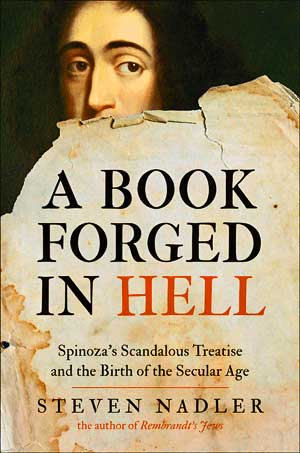
A Book Forged in Hell is about one of the most important and controversial books in Western history, one that continues to be vitally relevant today.
Writing in May, 1670, the German theologian Jacob Thomasius fulminated against a recent, anonymously published book. It is, he claimed, “a godless document” that should be immediately banned in all countries lest its dangerous message disseminate among the masses. His Dutch colleague, Regnier Mansveld, a professor at the University of Utrecht, insisted that the new publication was harmful to all religions and “ought to be buried forever in an eternal oblivion.” Willem van Blijenburgh, a philosophically inclined Dutch merchant, wrote that “this atheistic book is full of abominations … which every reasonable person should find abhorrent.” One disturbed critic went so far as to call it “a book forged in hell” and written by the devil himself.
The object of all this attention was a work titled Tractatus Theologico-Politicus (Theological-Political Treatise), and its author an excommunicated Jew from Amsterdam: Baruch de Spinoza. The Treatise was regarded by Spinoza’s contemporaries as the most dangerous book ever published. In their eyes, it threatened to undermine religious faith, social and political harmony, and even everyday morality. They believed that the author—and his identity was not a secret for very long—was a religious subversive and political radical who sought to spread atheism and libertinism throughout Christendom. The publication of and uproar over the Treatise is, without question, one of the most significant events in European intellectual history, occurring at (and perhaps even inaugurating) the dawn of the Enlightenment. While Spinoza’s incendiary book laid the groundwork for subsequent liberal, secular, and democratic thinking—not to mention radical strains in political and social thought—the contemporary debate over it and the furor it aroused also exposed deep tensions in a world that had seemingly recovered from over a century of brutal religious warfare.
Spinoza was the first to argue that the Bible is not literally the word of God but rather a work of human literature, an anthology of ancient writings handed down over generations and finally put together by a latter-day editor. He insisted that “true religion” and authentic piety have nothing to do with theology, clerical hierarchies, liturgical ceremonies, or sectarian dogma, but consist only in a simple moral rule: love your fellow human beings and treat them with justice and charity. He argued that ecclesiastic authorities should have no role whatsoever in the governance of a modern state. He also claimed that “divine providence” is nothing but the laws of nature; that miracles (understood as violations of the natural order of things) are impossible, and that the belief in them is an expression only of one’s ignorance of the true causes of phenomena; and that the prophets of the Old Testament were simply ordinary individuals who, while ethically superior, happened also to have particularly vivid imaginations. The book’s political chapters present as eloquent a plea for toleration (especially “the freedom to philosophize” without interference from the authorities) and democracy as has ever been penned.
Only recently has the Treatise started receiving the attention it deserves. Philosophical studies of Spinoza have long concentrated primarily on his metaphysical and moral masterpiece, the Ethics, thereby making the Treatise appear to be only of secondary interest and barely worth a mention. At the same time, there lately seems to be a tremendous amount of interest in Spinoza among the general public. A surprising number of novels, films, plays, and works of non-fiction (and even an opera) have been devoted to his life and ideas. Many people have heard of Spinoza, and probably know something or another about his “radical” and “subversive” thought, but they far outnumber those who have actually read either the Treatise or the Ethics.
The purpose of A Book Forged in Hell is to bring the Treatise, its fascinating history, and groundbreaking ideas to a larger reading public. I examine the philosophical, religious, and political theses of the Treatise, as well as the philosophical influences on Spinoza, the historical and political context of its composition and publication, and the uproar that followed its publication.
Spinoza’s Treatise is very much a product of its time—especially the immediate context of the Dutch Golden Age, with its heady mix of economic wealth, political liberalism, religious dissent, scientific and technological progress, cosmopolitan culture, and artistic riches. By the same token, Spinoza’s ideas were well ahead of their time; the world of early modern Europe was not ready to dismiss organized religion as nothing but organized superstition and the belief in miracles as grounded in ignorance. In so far as Spinoza’s scandalous treatise provides the foundations for a modern, secular, and tolerant state, it remains, today, one of the most vitally relevant works in the history of philosophy.
A Book Forged in Hell is an addition to my earlier studies of Spinoza and his philosophy: the biography I published in 1999, Spinoza: A Life; a book devoted to his excommunication from Judaism, Spinoza’s Heresy (2002); and a study of the Ethics (2006).
With this new book, I have completed what has turned out to be a long-term project on Spinoza, one devoted to making his life and the various dimensions of his thought accessible beyond academia to a broader reading public. It is a life and thought well worth studying today.
The way I have conceived this book, I would hope the browsing reader will open up to page one and immediately be taken by the story.
The opening pages put the reader in seventeenth-century Amsterdam and in the middle of proceedings by religious authorities to ban this “book forged in hell.” I intentionally start in a very intimate way with the controversy and uproar occasioned by the book, focusing on a couple of individuals who were involved in trying to put an end to the “pestilential publication”; I figured this personal approach was a good way to “hook” attention. From this initial episode, the story then moves back to the origins of the Treatise, the basic ideas of the work, the circumstances of its publication, and finally to scandal it caused.
I believe Spinoza’s Treatise remains one of the most relevant and important works in the history of philosophy. To the extent that we are committed to a secular, tolerant society, one which is characterized by a devotion both to freedom and to treating our fellow human beings with justice and charity, we are Spinoza’s ideological heirs. I very much hope that this book inspires people to go back and read Spinoza’s treatise for themselves, and perhaps that it even invigorates the fight for toleration, justice, social welfare, and a recognition that a modern society needs to be both liberal and secular and focused on the well-being of its citizens.


Steven Nadler is the William H. Hay II Professor of Philosophy at the University of Wisconsin-Madison, where he has been teaching since 1988. His books include Spinoza: A Life (1999, winner of the Koret Jewish Book Award), Spinoza’s Heresy: Immortality and the Jewish Mind (2002), Rembrandt’s Jews (2003, a finalist for the Pulitzer Prize), The Best of All Possible Worlds: A Story of Philosophers, God, and Evil (2008), The Cambridge History of Jewish Philosophy (co-edited, 2008), and A Book Forged in Hell: Spinoza’s Scandalous Treatise and the Birth of the Modern Age (2011). He is also the editor of the Journal of the History of Philosophy.